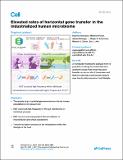Elevated rates of horizontal gene transfer in the industrialized human microbiome
Author(s)
Groussin, Mathieu; Poyet, Mathilde; Sistiaga Guiterrez, Maria Ainara; Kearney, Sean Michael; Moniz, Katya H; Noel, Mary; Hooker, Jeff; Gibbons, Sean Michael; Segurel, Laure; Froment, Alain; Mohamed, Rihlat Said; Fezeu, Alain; Juimo, Vanessa A.; Lafosse, Sophie; Tabe, Francis E.; Girard, Catherine; Iqaluk, Deborah; Nguyen, Le Thanh Tu; Shapiro, B. Jesse; Lehtimäki, Jenni; Ruokolainen, Lasse; Kettunen, Pinja P.; Vatanen, Tommi; Sigwazi, Shani; Mabulla, Audax; Domínguez-Rodrigo, Manuel; Nartey, Yvonne A.; Agyei-Nkansah, Adwoa; Duah, Amoako; Awuku, Yaw A.; Valles, Kenneth A.; Asibey, Shadrack O.; Afihene, Mary Y.; Roberts, Lewis R.; Plymoth, Amelie; Onyekwere, Charles A.; Summons, Roger E; Xavier, Ramnik Joseph; Alm, Eric J; ... Show more Show less
DownloadPublished version (31.09Mb)
Publisher with Creative Commons License
Publisher with Creative Commons License
Creative Commons Attribution
Terms of use
Metadata
Show full item recordAbstract
Industrialization has impacted the human gut ecosystem, resulting in altered microbiome composition and diversity. Whether bacterial genomes may also adapt to the industrialization of their host populations remains largely unexplored. Here, we investigate the extent to which the rates and targets of horizontal gene transfer (HGT) vary across thousands of bacterial strains from 15 human populations spanning a range of industrialization. We show that HGTs have accumulated in the microbiome over recent host generations and that HGT occurs at high frequency within individuals. Comparison across human populations reveals that industrialized lifestyles are associated with higher HGT rates and that the functions of HGTs are related to the level of host industrialization. Our results suggest that gut bacteria continuously acquire new functionality based on host lifestyle and that high rates of HGT may be a recent development in human history linked to industrialization.
Date issued
2021Department
Massachusetts Institute of Technology. Department of Biological Engineering; Massachusetts Institute of Technology. Center for Microbiome Informatics and Therapeutics; Massachusetts Institute of Technology. Department of Earth, Atmospheric, and Planetary SciencesJournal
Cell
Publisher
Elsevier BV